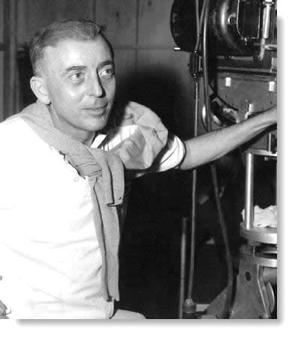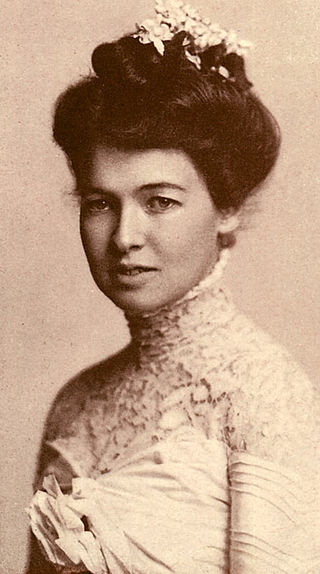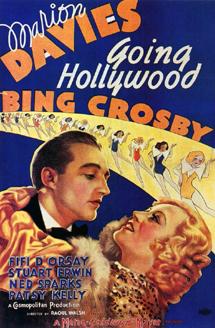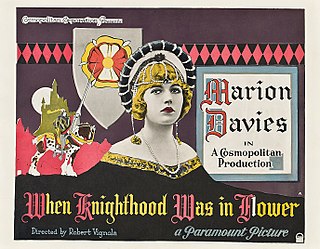Related Research Articles

Marion Davies was an American actress, producer, screenwriter, and philanthropist. Educated in a religious convent, Davies fled the school to pursue a career as a chorus girl. As a teenager, she appeared in several Broadway musicals and one film, Runaway Romany (1917). She soon became a featured performer in the Ziegfeld Follies.
Georgian Poetry is a series of anthologies showcasing the work of a school of English poetry that established itself during the early years of the reign of King George V of the United Kingdom.

Rhymney is a town and a community in the county borough of Caerphilly, South Wales. It is within the historic boundaries of Monmouthshire. With the villages of Pontlottyn, Fochriw, Abertysswg, Deri and New Tredegar, Rhymney is designated as the 'Upper Rhymney Valley' by the local Unitary Authority, Caerphilly County Borough Council. As a community, Rhymney includes the town of Rhymney, Pontlottyn, Abertysswg, Butetown and Twyncarno.

Beverly of Graustark is a 1926 American silent romantic comedy film directed by Sidney Franklin and starring Marion Davies, Antonio Moreno, and Creighton Hale. The film's screenplay was written by Agnes Christine Johnston based on the novel by George Barr McCutcheon, and set in the fictional land of Graustark. The film features a final sequence in Technicolor. It was the first film by Sidney Franklin for MGM.

Show People is a 1928 American synchronized sound comedy film directed by King Vidor. While the film has no audible dialog, it was released with a synchronized musical score with sound effects using both the sound-on-disc and sound-on-film process. The film was a starring vehicle for actress Marion Davies and actor William Haines and included notable cameo appearances by many of the film personalities of the day, including stars Charlie Chaplin, Douglas Fairbanks, William S. Hart and John Gilbert, and writer Elinor Glyn. Vidor also appears in a cameo as himself, as does Davies.

Charles Davies Lederer was an American screenwriter and film director. He was born into a theatrical family in New York, and after his parents divorced, was raised in California by his aunt, Marion Davies, actress and mistress to newspaper publisher William Randolph Hearst. A child prodigy, he entered the University of California, Berkeley at age 13, but dropped out after a few years to work as a journalist with Hearst's newspapers.

Marion Jones Farquhar was an American tennis player. She won the women's singles titles at the 1899 and 1902 U.S. Championships. She was inducted into the International Tennis Hall of Fame in 2006.

Going Hollywood is a 1933 American pre-Code musical film directed by Raoul Walsh and starring Marion Davies and Bing Crosby. It was written by Donald Ogden Stewart and based on a story by Frances Marion. Going Hollywood was released by Metro-Goldwyn-Mayer on December 22, 1933.

Quality Street is a 1927 American silent romance film directed by Sidney Franklin and starring Marion Davies, Conrad Nagel and Helen Jerome Eddy. Produced by Cosmopolitan Productions for release through MGM, it was based on the 1901 play of the same name by James M. Barrie. Prints of this film are preserved at the Library of Congress and in the Turner Archive.

The Patsy is a 1928 American silent comedy-drama film directed by King Vidor, co-produced by and starring Marion Davies for Cosmopolitan Productions, and released by Metro-Goldwyn-Mayer. It was based on a play of the same name by Barry Conners, and served as Marie Dressler's comeback film after a long slump in her film career. Davies played the dowdy and downtrodden Patricia, the younger daughter in a household ruled by an imperious mother (Dressler) and selfish sister.

The Restless Sex is a 1920 American silent drama film starring Marion Davies, and Ralph Kellard. It was directed by Leon D'Usseau and Robert Z. Leonard and written by Frances Marion. The film is based upon the 1918 novel of the same name by Robert W. Chambers and was distributed by Paramount Pictures under the Famous Players–Lasky Corporation name.

Enchantment is a 1921 American silent romantic comedy film produced by Cosmopolitan Productions and released by Paramount Pictures. The film was directed by Robert G. Vignola and starred Marion Davies. A print of the film exists in the Library of Congress.

When Knighthood Was in Flower is a 1922 American silent historical film directed by Robert G. Vignola, based on the novel by Charles Major and play by Paul Kester. The film was produced by William Randolph Hearst for Marion Davies and distributed by Paramount Pictures. This was William Powell's second film. The story was re-filmed by Walt Disney in 1953 as The Sword and the Rose, directed by Ken Annakin.

Little Old New York is a 1923 American silent historical drama film starring Marion Davies and directed by Sidney Olcott that was based on a play of the same name by Rida Johnson Young. The film was produced by William Randolph Hearst's Cosmopolitan production unit.

The Fair Co-Ed, also known as The Varsity Girl, is a 1927 American silent film comedy starring Marion Davies and released through MGM. The film was produced by William Randolph Hearst, through Cosmopolitan Productions and directed by Sam Wood. The film was released in a sound version in 1928 with a synchronized musical score with sound effects.

Five and Ten is a 1931 American pre-Code romantic drama film directed by an uncredited Robert Z. Leonard and starring Marion Davies, Leslie Howard and Irene Rich. Davies plays as an heiress and Howard the man she loves, though he marries someone else. The film was produced by William Randolph Hearst's Cosmopolitan Productions in partnership with Metro-Goldwyn-Mayer. It is based on the 1929 Fannie Hurst novel of the same name.
"I Go to Sleep" is a song written by Ray Davies which has been covered by numerous artists. Peggy Lee, the Applejacks and Cher recorded covers in 1965 without chart success. The Pretenders released a cover in 1981 which reached number seven on the UK Singles Chart.

April Folly is a 1920 American silent drama film directed by Robert Z. Leonard and written by Adrian Johnson and Cynthia Stockley. The film stars Marion Davies, Madeline Marshall, Hattie Delaro, Amelia Summerville, Conway Tearle, J. Herbert Frank, and Warren Cook. The film was released on March 21, 1920, by Paramount Pictures.

The Young Diana is a lost 1922 American silent drama film directed by Albert Capellani and Robert G. Vignola and written by Luther Reed. The film stars Marion Davies, Macklyn Arbuckle, Forrest Stanley, Gypsy O'Brien, and Pedro de Cordoba. It is based on the 1918 novel The Young Diana by Marie Corelli. The film was released on August 27, 1922, by Paramount Pictures.
Marianne is a 1929 American silent romantic-drama film about a French farm girl who, despite already having a French fiancé, falls in love with an American soldier during World War I. It was made first as a silent film, then as a musical with a different cast, but Marion Davies starred in both versions.
References
- ↑ "Marion Davies". Olympedia. Retrieved 2 July 2020.